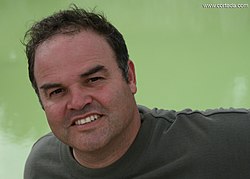Xavier Cortada
Xavier Cortada | |
|---|---|
 Xavier Cortada, 2007 | |
| Born | September 13, 1964[3][4] Albany, New York, U.S. |
| Education | University of Miami (BA, MA, JD) |
| Occupation | Artist |
| Years active | 2000-Present |
| Known for | Environmentally-oriented artwork |
| Awards | Millennium International Volunteer Award Outstanding Achievement Award |
| Website | cortada |
Xavier Ignacio Cortada (born September 13, 1964 in Albany, New York) is an American artist and former lawyer.
Early life
He grew up in Miami from the age of 3. He holds a degree from the University of Miami College of Arts and Sciences (Bachelor of Arts,1986), the Miami Business School (Master of Public Administration, 1991) and School of Law (Juris Doctor 1991).[5]
Career
Cortada's science art practice is oriented toward social engagement and the environment. He has created art installations in the Earth's poles to generate awareness about global climate change: In 2007, as a National Science Foundation Antarctic Artist and Writer's Program Fellow, the artist used the moving ice sheet beneath the South Pole as an instrument to mark time; the art piece will be completed in 150,000 years.[6] In 2008, he planted a green flag at the North Pole to reclaim it for nature and launch an eco-art reforestation effort.
Cortada often collaborates with scientists in his art-making:
- At CERN, Cortada worked with a physicist to develop a site-specific art installation capturing the five search strategies which the CMS experiment has used to discover a new Higgs-like particle. The five giant banners hang at the location (100m below the ground) where the particle was discovered.[7]
- He has also worked with a population geneticist on a project exploring our ancestral journeys out of Africa 60,000 years ago, with a molecular biologist to synthesize an actual DNA strand[8] made from a sequence randomly generated by participants visiting his museum exhibit, and with botanists in participatory eco-art projects to reforest mangroves, native trees and wildflowers.
- Cortada is currently working with scientists at Hubbard Brook LTER on a water cycle visualization project driven by real-time data collected at a watershed in New Hampshire's White Mountains.[9]
- At Florida International University, Cortada collaborated with Florida Coastal Everglades LTER scientists in using the diatoms they study to address sea level rise and environmental degradation. From 2011-18, Cortada based his engaged art-science practice at Florida International University where he served as Artist-in-Residence at FIU School of Environment, Arts and Society, the FIU College of Arts, Sciences & Education, and the FIU College of Communication, Architecture + The Arts.[10]
The Miami artist has worked with groups globally to produce numerous collaborative art projects, including peace murals in Cyprus and Northern Ireland, child welfare murals in Bolivia and Panama, AIDS murals in Switzerland and South Africa, juvenile justice murals and projects in Miami and Philadelphia, and eco-art projects in Taiwan, Hawaii, the Netherlands and Latvia.
Cortada has also been commissioned to create art for CERN, the White House,[11] the World Bank, the Florida Supreme Court, the Florida Governor's Mansion, Florida Botanical Gardens, Miami City Hall, Miami-Dade County Hall, the Florida Turnpike, Miami-Dade Housing Authority, the Frost Science Museum, Museum of Florida History, and the Frost Art Museum.
His work is in the permanent collections of the Perez Art Museum Miami (PAMM), the NSU Museum of Art in Ft. Lauderdale, the Whatcom Museum, the Patricia and Philip Frost Art Museum and the MDC Museum of Art + Design.
Corporations such as General Mills, Nike, Heineken, and Hershey's have commissioned his art. Publishers like McDougal and Random House have featured it in school textbooks and publications. His work has also been featured in National Geographic TV and the Discovery Channel.
Cortada's studio is located at Pinecrest Gardens where he serves as artist-in-residence, implements his participatory art projects and runs the Hibiscus Gallery. The artist also serves on boards of various national, regional and local groups, including University of Miami Alumni Association, South Arts and the Miami-Dade Cultural Affairs Council.
References
- ^ https://www.floridabar.org/directories/find-mbr/profile/?num=938386
- ^ https://www.martindale.com/palmetto-bay/florida/xavier-ignacio-cortada-812049-a/
- ^ Eco–Art History in East and Southeast Asia (2019), page 112
- ^ United States Public Records, 1970-2009 (Florida, 2002)
- ^ "X Factor". University of Miami News and Events. Retrieved 2018-07-10.
- ^ De Jesus, Carlos Suarez. "Bold as Ice". Miami New Times. Archived from the original on May 27, 2009. Retrieved 3 December 2009.
- ^ "Artist turns physicists into particles at CMS | CERN". home.cern. Retrieved 2018-07-10.
- ^ Cortada, Xavier (2011-02-04). "Painting the Genome for the Public". Science. 331 (6017): 548. doi:10.1126/science.1203069. ISSN 0036-8075. PMID 21292969.
- ^ "Artists in Residencies | Hubbard Brook". hubbardbrook.org. Retrieved 2018-07-10.
- ^ "Artist-in-residence Xavier Cortada creates art for Miami Beach Centennial". FIU News. Retrieved 2018-07-10.
- ^ "Exhibitions - Division of Cultural Affairs - Florida Department of State". dos.myflorida.com. Retrieved 2018-07-10.
- Global Warnings, by Suzaan Boettger, Art in America, Issue No. 6, pp. 154–161, 206-207, June/July 2008
- Bold as Ice, By Carlos Suarez de Jesus, Miami New Times, March 29, 2007
- Interactive Art About Climate Change in a City Where It Will Wreak Havoc. Hyperallergic. 2015-12-11. Retrieved 2018-07-10
